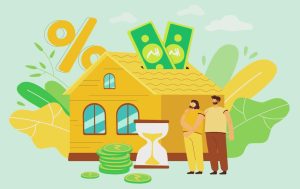- Have any questions?
- +880-1832219025
- englishrajib877@gmail.com
Home Loans for Bad Credit: A Comprehensive Guide(2024)

How to Refinance Your Mortgage and Save Thousands
September 14, 2023
Mortgage with Bad Credit A Comprehensive Guide
September 26, 2023Home Loans for Bad Credit: A Comprehensive Guide(2024)

Home Loans for Bad Credit-Homeownership is a dream for many, but it can be challenging to achieve if you have bad credit. A low credit score can make it difficult to secure a mortgage, and even if you do, you may end up paying a higher interest rate.
Can I get a home loan with bad credit?
Getting a home loan with bad credit can be challenging, but it’s not impossible. Lenders may still offer options, though interest rates could be higher.
Consider improving your credit score by paying bills on time and reducing debt. Exploring government-backed loans like FHA or VA may also be viable.
Providing a larger down payment can enhance your chances. Consulting with a mortgage advisor is crucial to navigating the process and finding the best solution for your specific situation.
What is the easiest home loan to get with bad credit?
Securing a home loan with bad credit can be challenging, but some options may be more accessible.
Federal Housing Administration (FHA) loans are often considered more lenient, requiring lower credit scores and down payments. Another option is a subprime mortgage, specifically designed for borrowers with imperfect credit.
However, these often come with higher interest rates. Exploring local or credit union options might also yield more flexibility.
Ultimately, improving credit through timely payments and reducing debt can enhance eligibility for conventional mortgages.
Consulting with financial advisors can provide personalized guidance for the most suitable home loan in challenging credit situations.
What is the lowest credit to get a home loan?
The minimum credit score required to secure a home loan varies among lenders and loan programs.
Generally, a FICO score of 620 is considered the minimum threshold for conventional mortgages, but government-backed loans like FHA loans may accept lower scores, sometimes as low as 500.
However, a higher credit score often leads to more favorable terms and lower interest rates.
It’s advisable to check with lenders to understand their specific requirements and explore ways to improve creditworthiness for better loan options.
What do mortgage lenders consider a bad credit score?
Mortgage lenders typically consider a credit score below 620 as indicative of poor credit. However, scoring criteria can vary among lenders. Factors such as late payments, high debt-to-income ratio, and a history of bankruptcy or foreclosure contribute to a lower credit score. Lenders may offer options, but terms may be less favorable.
FICO credit score ranges:
- 300-579: Poor
- 580-669: Fair
- 670-739: Good
- 740-799: Very Good
- 800-850: Excellent
How Bad Credit Affects Home Loan Approval
Bad credit significantly impacts home loan approval, as it signals financial risk to lenders. A low credit score may result in higher interest rates, larger down payments, or outright rejection.
Lenders use credit scores to assess an applicant’s creditworthiness, determining the likelihood of timely repayments.
A history of late payments, defaults, or bankruptcy can severely hinder one’s ability to secure favorable mortgage terms.
Improving credit through responsible financial behavior is crucial for enhancing eligibility and securing more favorable terms when seeking a home loan.
How to improve your chances of getting a home loan for bad credit
Improving credit score is a key factor in getting approved for a home loan. There are several steps to take to improve your credit score:
Check credit reports and scores: Get a copy of credit reports from each major credit bureau (Equifax, Experian, and TransUnion) through AnnualCreditReport.com. Review the reports for any errors or inaccuracies. Dispute any errors found with the credit bureau.
Pay bills on time: Late payments can have a negative impact on credit scores. Make sure to pay bills on time to avoid late fees and negative marks on your credit report.
Reduce credit utilization: Credit utilization is the amount of credit used compared to the credit limit. High credit utilization can negatively impact credit score. Try to keep credit utilization below 30% of the credit limit.
Pay off debt: High levels of debt can negatively impact credit scores. Pay off debt as quickly as possible to improve your credit score.
Keep credit accounts open: Closing credit accounts can negatively impact credit scores. Keep credit accounts open and use them responsibly to improve your credit scores.
Time Frame for Credit Score Improvement
Improving credit score takes time and effort. The time frame for credit score improvement can vary depending on the individual’s credit history and the steps taken to improve credit score.
Generally, it takes several months to see a significant improvement in credit score. However, it can take several years to achieve an excellent credit score. It is important to be patient and diligent in improving your credit score.
Home Loans for Bad Credit: 4 Mortgage Options
FHA Loans: The Federal Housing Administration (FHA) offers loans to individuals with credit scores as low as 500. However, the borrower must make a down payment of at least 10% of the home’s purchase price.
VA Loans: The Department of Veterans Affairs (VA) offers loans to veterans and their families. These loans have more relaxed credit score requirements, making them a viable option for individuals with bad credit.
USDA Loans: The United States Department of Agriculture (USDA) offers loans to individuals in rural areas. These loans have lower credit score requirements and do not require a down payment.
Conventional Loans: Private lenders offer conventional loans, which typically require a credit score of at least 620. However, some lenders may offer loans to individuals with lower credit scores.
Understanding Interest Rates for Bad Credit Home Loans
Individuals with bad credit scores may face higher interest rates when applying for a home loan. This is because lenders view them as higher-risk borrowers. It is important to shop around and compare interest rates from different lenders.
It is also important to consider the type of interest rate offered. Fixed-rate mortgages have a set interest rate for the life of the loan, while adjustable-rate mortgages (ARMs) have fluctuating interest rates. ARMs may start with a lower interest rate, but they can increase over time.
In conclusion, individuals with bad credit scores still have options when it comes to securing a home loan. It is important to research and compare different types of loans and interest rates before making a decision.
Application Process for Bad Credit Home Loans
Applying for a bad credit home loan can be a daunting task, but with the right preparation and knowledge, it can be a smooth process. This section outlines the documents required and the evaluation process for a bad credit home loan application.
Documents Required
When applying for a bad credit home loan, lenders will require certain documents to assess your eligibility. These documents may include:
- Proof of income: This can include pay stubs, tax returns, or bank statements.
- Credit report: Your lender will pull your credit report to assess your creditworthiness.
- Employment history: Lenders will want to see a stable employment history.
- Debt-to-income ratio: Lenders will want to see that your debt-to-income ratio is within an acceptable range.
- Down payment: Depending on the lender and loan program, you may be required to provide a down payment.
It is important to have these documents ready before applying for a bad credit home loan to speed up the application process.
Evaluation of Loan Application
Once you have submitted your application and documents, the lender will evaluate your eligibility for a bad credit home loan. The evaluation process may include:
- Credit score: Your credit score will be a major factor in determining your eligibility for a bad credit home loan. While a low credit score may not disqualify you from getting a loan, it may result in a higher interest rate or require a larger down payment.
- Debt-to-income ratio: Lenders will evaluate your debt-to-income ratio to ensure that you can afford the loan payments.
- Employment history: Lenders will want to see a stable employment history to ensure that you have a reliable source of income.
- Collateral: If you are applying for a secured loan, such as a mortgage, the lender may evaluate the value of the property to ensure that it is sufficient collateral for the loan.
It is important to be honest and upfront with your lender about your financial situation. Providing accurate information and documentation can increase your chances of getting approved for a bad credit home loan.
Dealing with Loan Rejection
Getting a loan rejection can be frustrating, but it’s not the end of the world. There are several reasons why a loan application can be rejected, including poor credit history, low income, and high debt-to-income ratio. Here are some steps that can be taken to deal with loan rejection:
1. Find out why the loan was rejected
The first step is to find out why the loan was rejected. Lenders are required to provide a notice that explains the reasons for the rejection. The notice will also include the credit score used to assess the application. Understanding the reasons for the rejection can help the borrower take corrective action.
2. Check credit report for errors
If the reason for the rejection is a poor credit score, the borrower should check their credit report for errors. Errors on a credit report can have a significant impact on the credit score. The borrower can dispute any errors with the credit reporting agency and have them corrected.
3. Improve credit score
If the credit score is low, the borrower can take steps to improve it. This can include paying bills on time, reducing credit card balances, and disputing any errors on the credit report. Improving the credit score can increase the chances of getting approved for a loan.
4. Consider a co-signer
If the borrower has a low income or high debt-to-income ratio, they may want to consider getting a co-signer. A co-signer is someone who agrees to take responsibility for the loan if the borrower is unable to make payments. Having a co-signer can increase the chances of getting approved for a loan.
5. Look for alternative lenders
If traditional lenders have rejected the loan application, the borrower can look for alternative lenders. Alternative lenders may have different criteria for approving loans and may be more willing to work with borrowers who have poor credit history or low income
Conclusion
Obtaining a home loan with bad credit can be a challenging process, but it is not impossible. By following the strategies outlined in this guide, borrowers can increase their chances of securing a home loan with a low credit score.
Frequently Asked Questions
What are the best home loan options for first-time buyers with bad credit and no down payment?
First-time homebuyers with bad credit and no down payment may qualify for an FHA loan. FHA loans are backed by the government and require a lower credit score and a smaller down payment than conventional loans. Another option is a USDA loan, which is designed for low to moderate income borrowers in rural areas and requires no down payment.
What are some mortgage lenders that offer guaranteed approval for bad credit home loans?
No mortgage lender can guarantee approval for a home loan, especially if the borrower has bad credit. However, some lenders cater to borrowers with bad credit and offer more flexible credit requirements. These lenders include Quicken Loans, New American Funding, and Carrington Mortgage Services.
Can I qualify for an FHA loan with a credit score of 500?
FHA loans require a minimum credit score of 500, but borrowers with a score between 500 and 579 must make a down payment of at least 10%. Borrowers with a credit score of 580 or higher can qualify for an FHA loan.
Related posts:
How to Refinance Your Mortgage and Save Thousands
Mushroom chocolate a delightful blend of flavors
Home Loan for First Time Buyer: A Comprehensive Guide






1 Comment
Good post